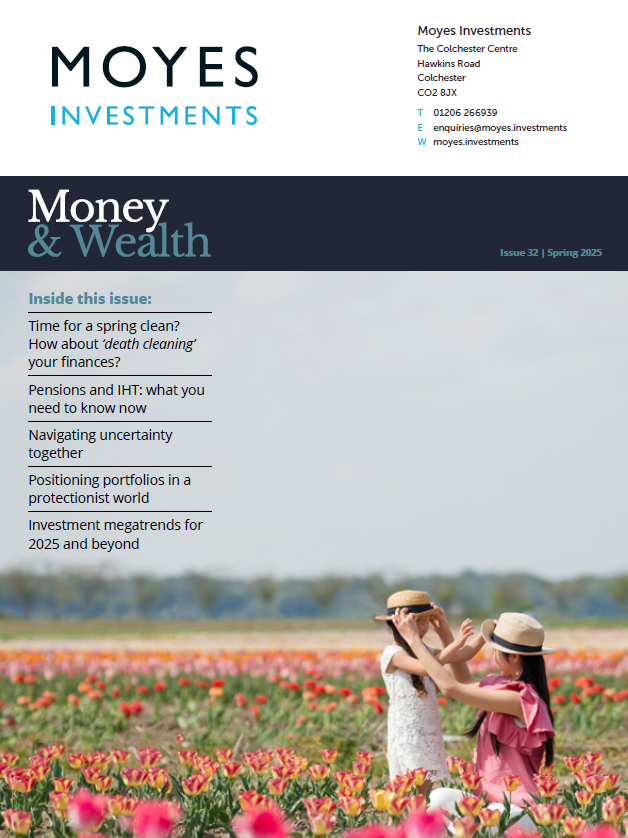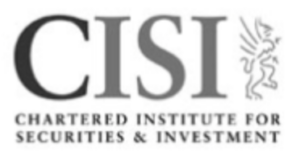Summer 2025
 With life moving fast, demands on our time and finances never-ending, it’s easy to push pensions down the priority list. Then there’s the
‘noise’ created by global geopolitics, economic challenges and their impact on markets and in turn your finances. Sometimes burying your head in the sand (preferably on a summer holiday) may seem like the most favourable option!
When it comes to your finances, neither inertia nor acting in haste is recommended. In fact, making informed, strategic, confident decisions about your wealth has arguably never been more important.
A decade on from pension freedoms: are savers making informed choices? Since pension freedoms were introduced in 2015, many over 55s have been accessing their pensions without understanding the tax implications or seeking advice. Research1 among over-50s has found that only four in ten had considered the tax implications of withdrawing taxable lump sums and just 39% had taken financial advice. Also, while
over half took the full 25% tax-free lump sum, many paid off debts or made the peculiar decision to move it into savings. Nearly one in five didn’t seek any guidance at all. With life expectancy on the rise, almost half of over-50s are worried about running out of money in retirement.
‘Lottery effect’ puts pension pots at risk Many retirees risk running out of pension savings by their late 70s as a result of the so-called ‘lottery effect’ (where access to large sums prompts impulsive spending) likely to blame, according to a new study2. One in seven see their pension lump sum as a bonus and nearly half access it simply because they can. With the average life expectancy of a current 60-year-old in
the UK sitting at 86, some retirees could be left with a shortfall between their retirement funds running out and the end of their life. With new rules likely to be introduced from 2027 regarding unused pensions becoming subject to Inheritance Tax (IHT), careful planning remains key to long-term retirement security.
Click here to read article in full
With life moving fast, demands on our time and finances never-ending, it’s easy to push pensions down the priority list. Then there’s the
‘noise’ created by global geopolitics, economic challenges and their impact on markets and in turn your finances. Sometimes burying your head in the sand (preferably on a summer holiday) may seem like the most favourable option!
When it comes to your finances, neither inertia nor acting in haste is recommended. In fact, making informed, strategic, confident decisions about your wealth has arguably never been more important.
A decade on from pension freedoms: are savers making informed choices? Since pension freedoms were introduced in 2015, many over 55s have been accessing their pensions without understanding the tax implications or seeking advice. Research1 among over-50s has found that only four in ten had considered the tax implications of withdrawing taxable lump sums and just 39% had taken financial advice. Also, while
over half took the full 25% tax-free lump sum, many paid off debts or made the peculiar decision to move it into savings. Nearly one in five didn’t seek any guidance at all. With life expectancy on the rise, almost half of over-50s are worried about running out of money in retirement.
‘Lottery effect’ puts pension pots at risk Many retirees risk running out of pension savings by their late 70s as a result of the so-called ‘lottery effect’ (where access to large sums prompts impulsive spending) likely to blame, according to a new study2. One in seven see their pension lump sum as a bonus and nearly half access it simply because they can. With the average life expectancy of a current 60-year-old in
the UK sitting at 86, some retirees could be left with a shortfall between their retirement funds running out and the end of their life. With new rules likely to be introduced from 2027 regarding unused pensions becoming subject to Inheritance Tax (IHT), careful planning remains key to long-term retirement security.
Click here to read article in full

)

 After a year of uncertainty, with many macroeconomic and geopolitical tensions affecting the landscape, investors may well be looking toward 2026 with cautious optimism. Despite the shocks of ‘Liberation Day’ trade announcements and the resulting sell-off, markets rebounded strongly last year to reach highs amidst persistent inflation, trade trauma and an AI-fuelled rally.
In an era where headlines can move markets within minutes – what’s the lesson for investors? Staying nimble, pragmatic and avoiding knee-jerk reactions remains key. So, what’s coming for investors in the year ahead? As 2026 gets underway, some themes are taking shape.
Balancing risks and rewards
The coming year, as ever, promises a mix of challenges and opportunities. Inflation in some key advanced economies remains above target, leaving monetary policy finely balanced. Persistent inflation could weigh on consumer sectors, demanding selective positioning, lower borrowing costs could support equities and despite notions of an AI bubble, continued investment in data centres and innovation
may sustain growth opportunities; time will tell. Markets may well be expecting rate cuts in 2026, but central banks may act more conservatively.
After a year of uncertainty, with many macroeconomic and geopolitical tensions affecting the landscape, investors may well be looking toward 2026 with cautious optimism. Despite the shocks of ‘Liberation Day’ trade announcements and the resulting sell-off, markets rebounded strongly last year to reach highs amidst persistent inflation, trade trauma and an AI-fuelled rally.
In an era where headlines can move markets within minutes – what’s the lesson for investors? Staying nimble, pragmatic and avoiding knee-jerk reactions remains key. So, what’s coming for investors in the year ahead? As 2026 gets underway, some themes are taking shape.
Balancing risks and rewards
The coming year, as ever, promises a mix of challenges and opportunities. Inflation in some key advanced economies remains above target, leaving monetary policy finely balanced. Persistent inflation could weigh on consumer sectors, demanding selective positioning, lower borrowing costs could support equities and despite notions of an AI bubble, continued investment in data centres and innovation
may sustain growth opportunities; time will tell. Markets may well be expecting rate cuts in 2026, but central banks may act more conservatively.

 With life moving fast, demands on our time and finances never-ending, it’s easy to push pensions down the priority list. Then there’s the
‘noise’ created by global geopolitics, economic challenges and their impact on markets and in turn your finances. Sometimes burying your head in the sand (preferably on a summer holiday) may seem like the most favourable option!
When it comes to your finances, neither inertia nor acting in haste is recommended. In fact, making informed, strategic, confident decisions about your wealth has arguably never been more important.
A decade on from pension freedoms: are savers making informed choices? Since pension freedoms were introduced in 2015, many over 55s have been accessing their pensions without understanding the tax implications or seeking advice. Research1 among over-50s has found that only four in ten had considered the tax implications of withdrawing taxable lump sums and just 39% had taken financial advice. Also, while
over half took the full 25% tax-free lump sum, many paid off debts or made the peculiar decision to move it into savings. Nearly one in five didn’t seek any guidance at all. With life expectancy on the rise, almost half of over-50s are worried about running out of money in retirement.
‘Lottery effect’ puts pension pots at risk Many retirees risk running out of pension savings by their late 70s as a result of the so-called ‘lottery effect’ (where access to large sums prompts impulsive spending) likely to blame, according to a new study2. One in seven see their pension lump sum as a bonus and nearly half access it simply because they can. With the average life expectancy of a current 60-year-old in
the UK sitting at 86, some retirees could be left with a shortfall between their retirement funds running out and the end of their life. With new rules likely to be introduced from 2027 regarding unused pensions becoming subject to Inheritance Tax (IHT), careful planning remains key to long-term retirement security.
With life moving fast, demands on our time and finances never-ending, it’s easy to push pensions down the priority list. Then there’s the
‘noise’ created by global geopolitics, economic challenges and their impact on markets and in turn your finances. Sometimes burying your head in the sand (preferably on a summer holiday) may seem like the most favourable option!
When it comes to your finances, neither inertia nor acting in haste is recommended. In fact, making informed, strategic, confident decisions about your wealth has arguably never been more important.
A decade on from pension freedoms: are savers making informed choices? Since pension freedoms were introduced in 2015, many over 55s have been accessing their pensions without understanding the tax implications or seeking advice. Research1 among over-50s has found that only four in ten had considered the tax implications of withdrawing taxable lump sums and just 39% had taken financial advice. Also, while
over half took the full 25% tax-free lump sum, many paid off debts or made the peculiar decision to move it into savings. Nearly one in five didn’t seek any guidance at all. With life expectancy on the rise, almost half of over-50s are worried about running out of money in retirement.
‘Lottery effect’ puts pension pots at risk Many retirees risk running out of pension savings by their late 70s as a result of the so-called ‘lottery effect’ (where access to large sums prompts impulsive spending) likely to blame, according to a new study2. One in seven see their pension lump sum as a bonus and nearly half access it simply because they can. With the average life expectancy of a current 60-year-old in
the UK sitting at 86, some retirees could be left with a shortfall between their retirement funds running out and the end of their life. With new rules likely to be introduced from 2027 regarding unused pensions becoming subject to Inheritance Tax (IHT), careful planning remains key to long-term retirement security.
 Could your finances benefit from a spring clean? You could take your cue from the Swedes. They believe in ‘döstädning,’ or ‘death cleaning.’ It sounds pessimistic, but it involves decluttering your belongings to reduce the burden you leave behind to loved ones.
The philosophy gained international prominence through a 2018 book called The Gentle Art of Swedish Death Cleaning, by Margareta Magnusson, but many of the methods described to organise your home and belongings can be applied to your finances as well.
Why should you death clean your finances?
First, it can help you feel more in control of your money. Second, it can help you refocus your time (and money) on what matters most to you.
And third, taking time to organise your finances now could spare your loved ones from a great deal of emotional and financial stress after you die.
Key steps in a financial spring clean
It’s a good idea to make a checklist and work your way through. Key steps include:
Streamline your finances
Close accounts you don’t use, cancel unused subscriptions or memberships, and explore ways to cut back on wasteful spending.
Could your finances benefit from a spring clean? You could take your cue from the Swedes. They believe in ‘döstädning,’ or ‘death cleaning.’ It sounds pessimistic, but it involves decluttering your belongings to reduce the burden you leave behind to loved ones.
The philosophy gained international prominence through a 2018 book called The Gentle Art of Swedish Death Cleaning, by Margareta Magnusson, but many of the methods described to organise your home and belongings can be applied to your finances as well.
Why should you death clean your finances?
First, it can help you feel more in control of your money. Second, it can help you refocus your time (and money) on what matters most to you.
And third, taking time to organise your finances now could spare your loved ones from a great deal of emotional and financial stress after you die.
Key steps in a financial spring clean
It’s a good idea to make a checklist and work your way through. Key steps include:
Streamline your finances
Close accounts you don’t use, cancel unused subscriptions or memberships, and explore ways to cut back on wasteful spending.




